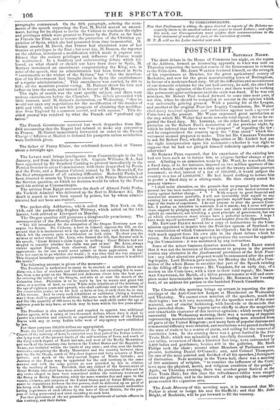POSTSCRIPT.
SATURDAY NIGHT.
The short debate in the House of Commons last night, on the report of the Address, formed an interesting appendix to what was said on Thursday respecting the intended course of the Government in relation
to the Corn-laws. Mr. Jon ts WALTER declared himself, on the strength of his experiences as Member, for the great agricultural county of Berkshire, and now for the great manufacturing town of Nottingham, in favour of a moderate fixed duty. Of all the difficulties and uneasinesses of our domestic relations for the last half century, he said, the chief had arisen from the agitation of the Corn-laws ; and there would be nothing like permanent quiet settlement until the scale was fixed. If be was not mistaken, Sir Robert Peel looked forward to some time next 3 ear, if not this, when he should be compelled to concur in the opinion w Isich was universally gaining ground. With a passing bit at the League, and another at the original Poor-law Inquiry Commission, Mr. Walter cited many received opinions and authm ities against such a sy stem of Corn-laws as the present. Mr. WARD expressed great satisfaction at the step which Mr. Walter had made towards total repeal, for so he re- garded the fixed duty. Mr. LIDDELL, on the other hand, put an inter- pretation on Sir Robert Peel's declaration of the previous night, by which he inferred that there was "no prospect" of repealing the law ; and he congratulated the country upon the "firm stand" which Go- vernment seemed prepared to make. This led Mr. CHARLES VILLIERS to ask Sir Robert Peel, whether the Opposition or Mr. Liddell bad put the right interpretation upon his statement—whether it was right to suppose that he had not pledged himself definitely against change, or otherwise?
Sir ROBERT PEEL repeated, that his experience of the existing law had not been such as to induce him to propose further change at pre- sent. Alluding to an admission made by Mr. Ward, he remarked, that a fixed duty, of 5s. for instance, imposed on two million quarters of im- ported wheat, would operate as a duty on all the twenty million quarters consumed ; so that, instead of a tax of 500,0001., it would subject the country to a tax of 5,000,000/.1 He had heard nothing to induce him to prefer a fixed duty to a sliding-scale. He then clearly stated his present views- " 1 shall resist alteration, on the grounds that no proposal better than the
present law has been made—nothing which would give the landed interest se- curity against further change. • • • With respect to great financial and commercial measures 'generally, I will not irrevocably bind myself to any existing law or measure, and by so doing preclude myself from taking advan- tage of the fruits of experience. I do not propose to alter the present Corn- law, I profess an intention to maintain it as it stands; but 1 never will pur- chase support by pledging myself at all times and under all circumstances to uphold an enactment, not involving a great principle of government, but one on which circumstances must always have a powerful influence. I hope I have made myself understood." (Cheers and laughter from the Opposition.)
Mr. EDWARD ELLICE moved for a copy of instructions to the Com-
mission appointed to inquire into the Poor-law system of Scotland : to the constitution of which Commission he objected ; but he did not meet with much support from his own side in the short debate which he raised. Sir JAMES GRAHAM agreed to produce the warrant for appoint- ing the Commission : it was unfettered by any instructions.
Some of the minor business deserves mention. Lord ELIOT stated
that it was not the intention of Government to propose in the present session any alteration in the fundamental provisions of the Irish Poor- law : any other alterations proposed would be announced after the pend- ing inquiry. Lord Bowles gave notice, for Monday the 13th, of a Com- mittee of the whole House to consider that part of the Speech relating to the falling off in the revenue ; Mr. VILLIERS, for an early day, of a motion on the Corn-laws, with a view to their total repeal ; Mr. SEAR- MAN CRAWFORD, for March, of a bill to protect tenants at will and occu- piers under determinable leases in Ireland ; Mr. ROEBUCK, for 'I uesday next, of an address for pardon to the banished French Canadians.


























 Previous page
Previous page